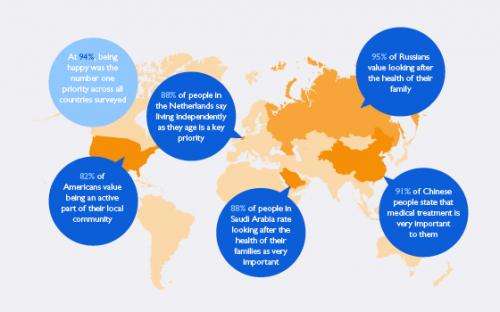New survey unveils worldwide innovation gap: Only five out of ten people satisfied with innovations currently available

Royal Philips Electronics released its "Meaningful Innovation Index " today, during its participation at the World Economic Forum in Davos, Switzerland. The Meaningful Innovation Index is a 5000-person, multi-country survey looking at people's needs, attitudes and expectations regarding innovation. Based on responses from five key markets, the survey shows that even with the recent advances in technology, there is huge appetite for innovations that will make a real difference in people's everyday lives.
Philips' Meaningful Innovation Index looked at satisfaction with current innovations with what is truly important in people's lives and found that only 54% of people are satisfied with existing innovations in the areas they considered to be the most important to their lives. People's preferences across age groups and various lifestages consistently point toward an 'innovation gap', indicating that there is room for companies to innovate in ten key areas of life: protecting the environment, saving money, stress relief, living independently as one ages, education, preventative health (preventing disease and illness), medical treatment, medical diagnosis, workplace efficiency and saving time.
"Addressing the 'innovation gap' presents significant opportunities for companies," said Jim Andrew, Philips Chief Strategy and Innovation Officer. "For Philips in particular, this drives us to introduce truly life-changing innovations to our customers and by doing so, help address some of the society's great challenges."
People believe innovation will bring better health in the future:
- Almost three-in-five (58%) of people believe future innovations in medical technology will mean they will not be affected by serious illness.
- 64% of people expect to be able to manage their own health better through technology.
- Both young (18-24) and old (+65) generations consistently rank the same five areas of life as being most important to them: being happy, sleeping well, comfortable home to live in, a sense of safety in home environment, and communication with friends and family.
- 67% of seniors (65+) felt that technology had made their lives better, close to 74% of youth (18-24) who feel the same way.
- The importance of living independently does, as expected, increase as people get older but is a significant issue for all: 66% of seniors and 52% of youth are satisfied with products in this area.
- Both young (18-24) and old (+65) generations consistently rank the same five areas of life as being most important to them: being happy, sleeping well, comfortable home to live in, a sense of safety in home environment, and communication with friends and family.
- 67% of seniors (65+) felt that technology had made their lives better, close to 74% of youth (18-24) who feel the same way.
- The importance of living independently does, as expected, increase as people get older but is a significant issue for all: 66% of seniors and 52% of youth are satisfied with products in this area.
"Innovation is the lifeblood of Philips and we are focused intently on improving the lives of people around the world by delivering meaningful innovations. By doing this, we will help countries improve their economic health and drive continual improvements in health and well-being of people on the planet," concluded Jim Andrew.
Starting today, 23 January 2013, Philips is actively contributing to the international debate at the Annual World Economic Forum, taking place in Davos, Switzerland. Throughout the forum Philips will make a positive case for stimulating meaningful innovation at two levels: to improve people's individual lives as well as to drive economic and societal prosperity.
More information: Full survey results of The Meaningful Innovation Index are available on the Philips Center for Health and Well-being website, www.philips-thecenter.org/Mean … ul-Innovation-Index/
Provided by Philips




















